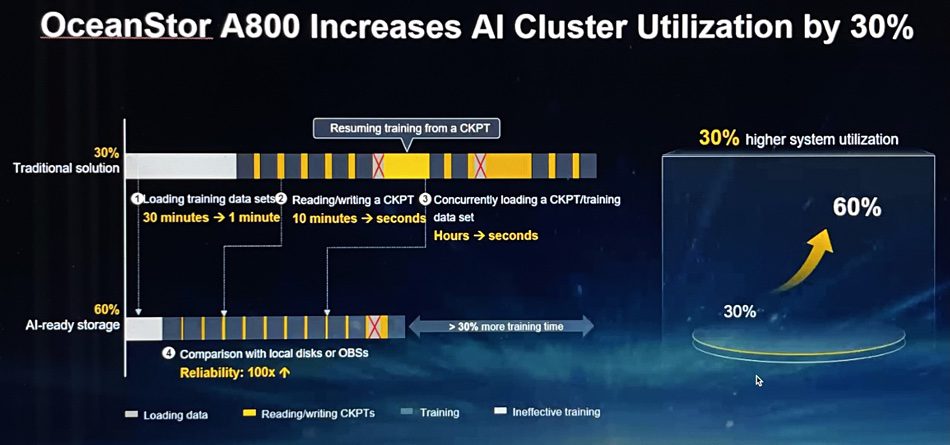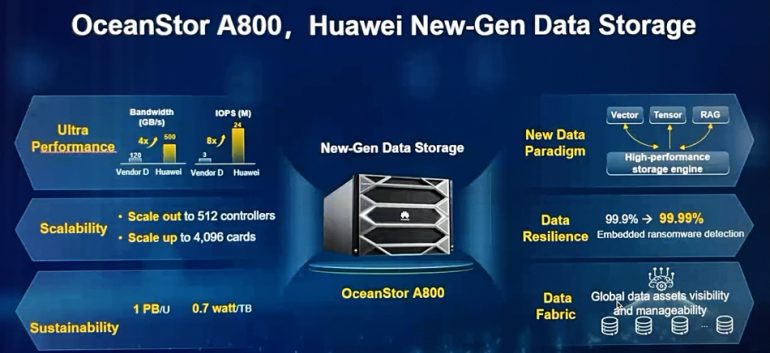- Huawei unveils the A800 AI storage system, designed to accelerate AI training on multi-petabyte datasets.
- The A800 features a scale-out architecture supporting 100 million IOPS and petabytes-per-second bandwidth.
- It joins Huawei’s A-series lineup, complementing the Dorado all-flash arrays and Pacific scale-out hybrid data lake products.
- Dr. Peter Zhou highlights the future of data storage, emphasizing performance, scalability, and new data paradigms.
- The A800 boasts SmartMatrix Pro architecture and OceanFS parallel file system for real-time hyper-cluster scheduling.
- Utilizing Arm-based Kunpeng processors, the A800 delivers ten times higher performance than traditional storage.
- It supports up to 512 controllers and 4,096 computing cards, with a roadmap for 128 TB SSDs next year.
- The A800 offers a storage density of more than 1 PB per rack unit and a six nines data reliability measure.
- Features include vector index tensor data support, Omni-Dataverse global file system, and AI-driven IT operations.
Main AI News:
Huawei, a global leader in technology innovation, has just launched its latest breakthrough: the A800 AI storage system. This cutting-edge solution is meticulously crafted to revolutionize AI training processes, particularly on multi-petabyte datasets. Boasting a scale-out architecture, the A800 is primed to deliver unparalleled performance, supporting a staggering 100 million IOPS and petabytes-per-second bandwidth.
Following the successful introduction of the A310 last year, the A800 joins Huawei’s esteemed A-series lineup, standing alongside the acclaimed Dorado all-flash arrays and Pacific scale-out hybrid data lake products within the OceanStor product family. Huawei first unveiled the A800 AI storage system in China last September, and its features were extensively discussed at the recent Data Infrastructure Forum event held in Berlin.
Dr. Peter Zhou, Vice President and President of Huawei Data Storage Product Line, articulated Huawei’s vision for the future of data storage, emphasizing the pivotal role of innovation in the “Data Awakening Era.” He outlined key drivers shaping the landscape, including ultra-performance, data resilience, scalability, and the emergence of new data paradigms.
In anticipation of the AI-centric future, Huawei asserts that data storage must evolve to meet escalating demands for performance and scalability, reaching unprecedented levels of efficiency and capacity. The A800 emerges as a next-generation, high-performance NAS storage system, equipped with a host of advanced features tailored for AI workloads.
At its core, the A800 embodies a sophisticated architecture that facilitates seamless data management and control. With its OceanFS high-performance parallel file system and flexible expansion capabilities, the A800 ensures optimal support for real-time hyper-cluster scheduling, empowering organizations to harness the full potential of AI technologies.
Furthermore, the A800 integrates SmartMatrix Pro architecture, enabling efficient data transfer and eliminating bottlenecks associated with traditional storage systems. Huawei touts a remarkable tenfold increase in performance compared to conventional solutions, achieving an impressive 24 million IOPS per controller enclosure.
This exceptional performance translates into tangible benefits for AI practitioners, enabling rapid checkpointing and streamlined training processes. With the ability to scale out to exabyte capacity levels, the A800 sets a new standard for storage scalability and flexibility in the AI era.
Notably, Huawei’s commitment to innovation is underscored by the utilization of Arm-based Kunpeng processors, signaling a departure from traditional x86 CPUs. This strategic choice underscores Huawei’s dedication to pushing the boundaries of technology and driving industry-wide transformation.
In terms of storage capabilities, the A800 delivers unparalleled density, boasting more than 1 PB per rack unit (PB/u) and an astonishingly low electricity draw of 0.7 watt/TB. Coupled with a six nines data reliability measure, the A800 offers a robust foundation for AI workloads, supporting advanced data structures such as vector index tensor data and retrieval-augmented generation (RAG).
Additionally, the A800 features an Omni-Dataverse global file system and Data Management Engine (DME), facilitating seamless data management and mobility. Leveraging AI for IT operations (AIOps), Huawei empowers organizations to proactively identify and mitigate potential system risks, ensuring uninterrupted performance and data protection.
As organizations navigate the complexities of the AI era, the A800 emerges as a beacon of innovation, offering unparalleled performance, scalability, and reliability. Scheduled for release later this year, the A800 heralds a new chapter in the evolution of data storage, setting the stage for transformative advancements in AI-driven technologies.

Source: Situation Publishing
Conclusion:
Huawei’s introduction of the A800 AI storage system signifies a pivotal advancement in the data storage landscape, particularly in the context of the burgeoning AI era. With its unparalleled performance, scalability, and advanced features, the A800 sets a new standard for storage solutions, empowering organizations to unlock the full potential of AI technologies and drive transformative innovation across industries.

